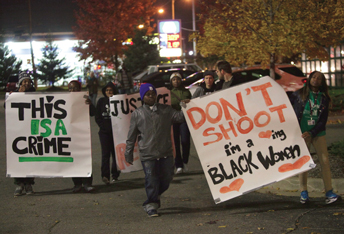It was the worst news a Michigan family, or any family, could hear: A loved one is shot dead, doing nothing except trying to get some help.

The fatal shooting of Renisha McBride in the predominantly White suburb of Dearborn Heights, brought unspeakable pain to her loved ones and heartache to Black America.
Police said she had a car accident, tried to get help and was killed. The person who shot her says he thought she was breaking into his home and the shooting was accidental, police add.
Isn’t it interesting that these fatal shooting accidents never seem to happen to White people?

We have seen Black teenagers, a 90-year-old Black man in South Carolina, and a Black man in North Carolina seeking help after an accident dead under strange circumstances. Nothing seems to be able to be done about it. There is police stalling, stonewalling or failure: An unarmed Black person is shot to death, no arrests are made, and somehow the shooter ends up getting protected. The person who discharged a shotgun into Renisha’s face was not even identified at Final Call presstime. According to media reports, police refused to give the race of the shooter. Dearborn Heights has a small Black population and sizable population of Middle Eastern and European origin.
So much for the public’s right to know, huh?
“The alleged assailant did not, according to reports, immediately notify the police that the shooting had taken place,” said a statement from the 19-year-old victim’s family. “It was reported that instead neighbors contacted police about the shooting.”
“After knocking on a neighbor’s door, instead of being aided in the situation or police called for an investigation, she was shot fatally in the head. Have we become a society where we are no longer our neighbors’ keeper? This shooting must be investigated at every level,” said the Detroit NAACP.
“Was this a racial profiling? Was this shooting warranted when the evidence indicates that Ms. McBride had no weapon, created no disturbance, threatened no break-in, or demonstrated no disrespect to the household in question? … Since when has knocking on the door for help due to car trouble provided the justification to commit a deadly offense?” the NAACP asked.
We are not “neighbors” in this country, we are a menace to be controlled or eliminated. We are a threat regardless of age, sex, size, or circumstance.
The historical and constant misrepresentation of who we are dehumanizes us and make us easy prey in a society where Black deaths, in particular the deaths or loss of Black females, are unimportant.
Those believed to have killed other women–Nicole Brown Simpson, Laci Petersen, Natalee Holloway or Stacy Peterson–must be found and punished. But who cares if Tyesha, Keisha or LaChelle die?
“Overall, Black females were murdered by males at a rate (2.61 per 100,000) more than two and a half times higher than White females,” according to a Violence Policy Center analysis of single female-single male encounters that resulted in such deaths. Similar to Black males, Black females suffered disproportionately from death at the barrel of a gun. Sadly, like most women, Black women were more likely to be killed by an intimate partner or ex-partner than a stranger. The gun homicide rate for females 10-24 years old was highest among Black women with 4.6 deaths per 100,000 population, according to the Centers for Disease Control.
But Black women also seem more likely to die in encounters with law enforcement or incidents that would be unthinkable, if they were not Black. Black lives mean nothing in this society. Yet despite our pain and our protests, we often don’t reach a basic conclusion. The fight for our survival can’t be one-sided and it can’t be reactionary. It must be constant, unified and attack the systemic causes of violence, whether suffered at the hands of others or fratricidal acts committed on one another.
We have to admit racial oppression, racial powerlessness, racial disunity, racial deprivation and racial self-hatred exist and have consequences. Denying reality and trying to hide behind our education, income, address, or profession won’t protect us. We are all Renisha and the quicker we face that fact, the quicker we can get justice for her family, confront our own demons and protect our community from deadly enemies.
(Final Call editor-in-chief Richard B. Muhammad can be reached at [email protected]. You can also follow him on Facebook and @RMfinalcall on Twitter.)












